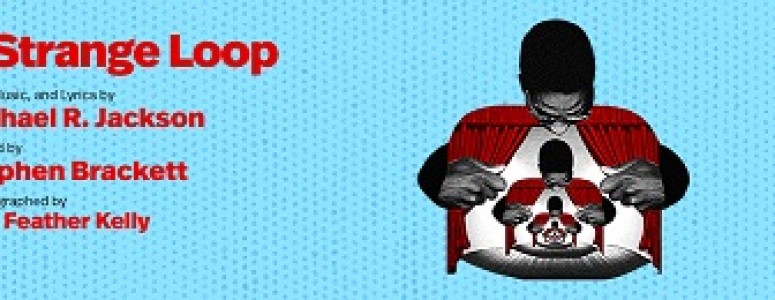Let’s never again hear another word on how THE BOYS IN THE BAND deserves to be castigated for its so-called whiny and self-loathing characters.
Not as long as A STRANGE LOOP is in town.
BOYS is 51 years old. In 1968, a man’s being gay DID mean scorn, disgrace and revulsion from straights. Its gays were telling the plain truth about gay life back then.
LOOP was written as out-and-proud gays were preparing to celebrate the 50th anniversary of Stonewall. You’d never know it, though, from this pop-rock musical. The way its main character views his life would seem to be more apt for the time when the Edsel hit the market and westerns ruled the TV airwaves.
For this new work at Playwrights Horizons has a central character who says that he is “gay, black, fat and ugly” – and reminds us of it every few minutes.
He’s called Usher, although he’s not the pop entertainer who played Billy Flynn for eight weeks in 2006. The character is so named because A STRANGE LOOP’s bookwriter, composer and lyricist – they’re all one and the same — was indeed once an usher at THE LION KING. All the while he was there, he was working on a musical that he hoped would be produced.
It has, thanks to Playwright Horizons’ artistic director Tim Sanford and director Stephen Brackett, both of whom obviously saw the considerable talent of Michael R. Jackson. (The “R” is important for obvious reasons.) He’s written terrific music and craft-attentive lyrics.
But, oh, does he whine and express more self-loathing than all eight gay men in THE BOYS IN THE BAND combined. This triple threat of talent ultimately comes across as a real threat to himself.
Larry Owens gives a magnificent performance as Usher under difficult circumstances. So does everyone else in the cast.
Sure, Usher eventually rails against his holy-roller and close-minded parents with a vigorous and self-liberating speech. As well written as the harangue is, it only received a smattering of applause at the July 7th matinee. Perhaps considering all of Usher’s self-hatred that the theatergoers had witnessed and been reminded of, they couldn’t believe that his rebellion was anything more than a momentary outburst and that it would have no lasting effects. By this point, no speech would have been enough to convince them that Usher – no, make that Usher/Jackson — had eradicated all the feelings of inferiority that he’d displayed all afternoon.
Compare Usher/Jackson to Bernard, the one African-American character man in THE BOYS IN THE BAND. Although in the six productions I’ve seen (plus the 1970 film) he’s not been cast as heavy or unattractive, he’s as black and gay as Usher/Jackson. The worst Bernard does is let the effeminate Emory tease him – pretty much good-naturedly – about his blackness.
If Bernard makes any mistake at all, it’s his phoning a man he once loved who wasn’t able to make a long-term commitment then and undoubtedly wouldn’t now. Hel allows himself to relive the rejection.
Yet a case could be made that it was a chance worth taking. Along the way, Bernard is dignified and never remotely comes close to chastising himself the way Jackson does.
By the way, I’ve met Jackson a few times. Although everyone has his own values and standards where attractiveness is concerned, I didn’t come away thinking that he was particularly heavy. For that matter, he’s not at all ugly. He’s far closer to cute.
Sure, he’s one of those guys who superficially reads as gay and there’s no denying that he’s black. But really – must his opinion of himself really be this low?
Granted, when personal ads used to take up page after page of THE VILLAGE VOICE and other publications, the “Men Seeking Men” section had many entries that ended with “No Femmes or Fatties.” Still, in the There’s-a-Lid-for-Every-Pot category, he should be able to find someone. And if his self-seen flaws mean so much to him (which they obviously do for him to reveal them for an hour and forty minutes), there are diet and exercise programs that would take care of one of his semi-imagined deficiencies.
Instead, Usher/Jackson endures a graphic scene where he allows himself to be dominated and humiliated by a white man. While it’s actually happening, what he says informs us that he really believes he’s getting what he deserves.
Maybe Jackson will find (or, God willing, already has found) an ardent beau who appreciate his abilities and wit.
We often say of a promising newcomer “I can’t wait to see what he writes next.” This is certainly and unmistakably one of those times. Michael R. Jackson is so uber-talented that he’ll soon be courted by a big movie studio to make a Broadway musical out of one of their films.
Let’s just hope it’s not THE BOYS IN THE BAND.




